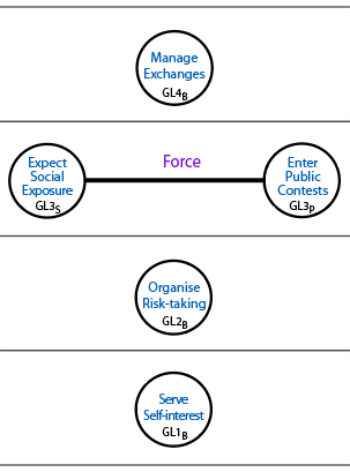Become Secure
The requirement that defines each Grouping will now be considered as if it is a Level and the impact of the dynamic duality analysed. The Centre(s) that result will be appropriately named and where the level is bipolar, one Centre will be assigned due dominance. For this set, we will work from below upwards because all security rests on effectively .
G1: Serve Self-Interest
Self-interest is based on the 7 means of benefiting. You have to serve your own self-interest because no-one else will do this for you. Others cannot know what is in your interest because they cannot see your inner life, appreciate your social limitations or know your secret aspirations.
Dynamic Duality: Serving self-interest cannot be a purely socially controlled choice, so this level must be unipolar. But social factors and forces cannot just be ignored. While self-interest is purely personal, serving it is shaped by possibilities in the milieu. So the two influences are fused or synthesized.
In the Tree, this level becomes a single balanced Centre: .
We label :
G2: Organise Risk-taking

Risk-taking takes 6 basic forms. In all cases, you have to be the one who commits to the risk and others, often many others, become aware of your commitment. While risk-taking must be based on your preferences, resources, and tolerances, this judgement is inevitably constrained by current opportunities, practicalities and social factors.
Dynamic Duality: There must be personal control and there can be no purely social version. Again, risk-taking results from a fusion of personal choosing and social forces and factors
So, in the Tree, this level becomes a single balanced Centre: .
We will label :
G3: Handle Exposure
Five spheres of contest that expose you were identified. You decide to enter any of these contests with passion because the matter is personally meaningful for you. However, staking out a position exposes you more or less publicly in the face of competition or opposition.
Dynamic Duality: Only you decide whether the matter is meaningful enough for you to want to enter into a contest, and then you have to do your best. There is no direct social contributions to this decision, nor are there any specific social demands. It is a personal matter—others may think your choice is futile or foolish. However, you will be publicly exposed to a greater or lesser degree, and there will be judgements made by others that could affect you. While you play no part in these judgements, you must tolerate the emergence of these judgements and be ready to handle any consequences.
This means that this level in the Tree will generate two polarized but connected Centres: and .
We label :
and label :
When you contest, you expose yourself to the judgement of others whether you win or lose. You cannot control the exposure that occurs: social factors and forces do that. Entering the contest will be dominant, but this choice will be affected by an awareness of your exposure. As a result, the two Centres will affect each other.
So the personal Centre is dominant and placed on the right side of the Tree.
G4: Manage Exchanges
To get satisfied and gratified in social life, it is necessary to interact with others and make exchanges that work for both parties. The 4 great social systems used for exchange—markets, hierarchies, networks, core groups—dominate our lives. This fits with the position of this centre at the heart of the Tree and connected to all others except .
Dynamic Duality: Any exchange has to be a choice of yours, but it cannot be separated from the choice of others by defintion.
So, in the Tree, this level becomes a single balanced Centre: .
We will label :
Conclusion
If you can serve your own interests, organise risks, handle exposure and manage exchanges, then you will have a secure persona that is likely to be able to ensure your social standing. However, this takes a lot of energy.
- Continue to the levels that energize yourself.
Originally posted: 10-Oct-2025.

